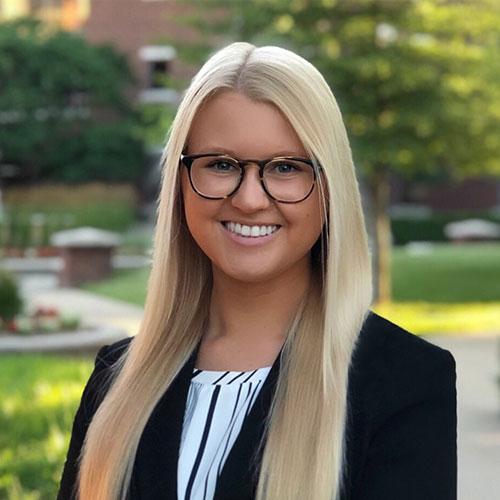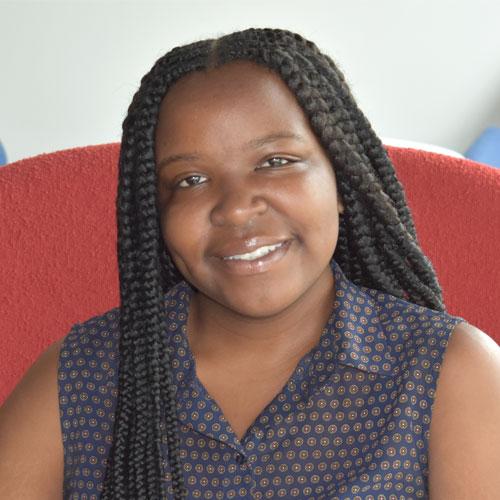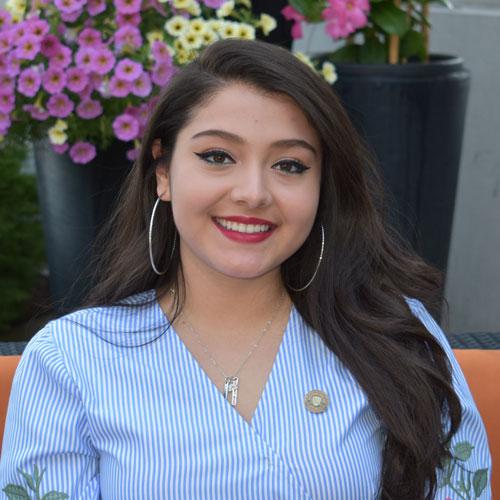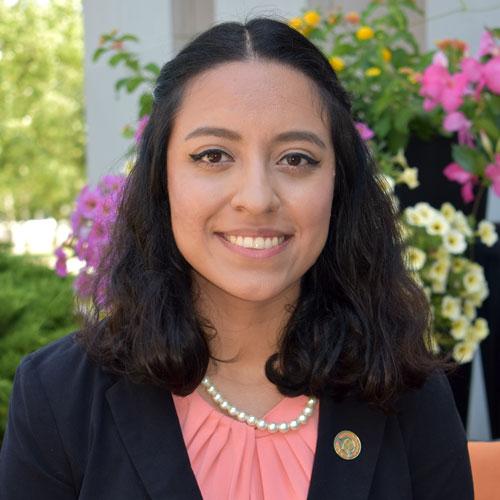
Students Spend Summer Vacation Doing Research
AHS E-News: September 2019
Many undergraduate students spend their summers working to earn money they can apply toward their education. Others may seize the opportunity to broaden their horizons through travel. Some remain on campus to take classes and continue making progress toward the completion of their degrees.
For students who participate in programs such as the TRIO McNair Scholars and Carl R. Woese Scholars, however, summer is a time for pursuing research and honing skills that will serve them well in graduate and professional schools. In July, AHS student scholars showcased what they did on their summer vacations at the Summer Research Symposium.

Monika Ziogaite: Hoping to shed more light on cancer
Monika Ziogaite, a senior in Interdisciplinary Health Sciences, will pursue a career in medicine after completing her degree. She hopes to specialize in oncology, an interest that was motivated in part because of occurrences of cancer within her own family. That interest, combined with her belief that research advances medical knowledge and practice, led her to join the Cancer Research Lab of Dr. Zeynep Madak-Erdogan of the Department of Food Science and Human Nutrition.
As a Carl R. Woese Undergraduate Research Scholar, she spent the summer investigating the relationship between KPNA2 and XPO1, two of the highest-expressed proteins within breast cancer subtypes, to determine whether there are metastatic tissue-specific interactions between these proteins in an endocrine-resistant breast cancer model. Her findings suggested a tissue-specific dependent interaction which could be further used to understand the proteins’ contribution to metastasis. Monika also found that the proteins had a more consistent interaction upon treatment with tamoxifen, the most commonly prescribed medication for the prevention and treatment of breast cancer, a result that she will continue to investigate in the coming year.
Monika says she welcomed the opportunity to devote her summer to research. “It’s really difficult to do research during the school year while you’re taking classes and fulfilling other obligations, so it was great to be able to have that intense focus over the summer,” she said. Doing research as an undergraduate has allowed her to develop a different way of thinking that focuses on real-world obstacles and critical analysis. “I have not only grown as a scientific thinker but also overall as a student in a STEM field,” she said. “I look forward to continuing with research and further investigating all that remains unknown.”

Keena Preston: Healing after gender-based violence
Senior Keena Preston plans to pursue a Ph.D. in Public Health and an academic career after graduating next May with a degree in Community Health. As a TRIO Ronald E. McNair Post-Baccalaureate Achievement Program Scholar, she worked with Dr. Helen Neville of the Departments of Educational Psychology and African American Studies on a project that examined the healing process of survivors of sexual assault.
After conducting a review of existing literature on the subject, Keena began to collect written narratives from survivors about the impact of the assault, how they are healing, and the things that have helped in their healing process. She is interested in the role race and gender play in the healing process, as well as the roles played by family, social activism, and participation in activities such as dancing and art.
Engaging in research was the definitive experience of her undergraduate career, Keena said, and helped clarify her career path. “I discovered that this is really what I want to do. I am passionate about this topic, and I have been able to express that passion through my research,” she said. She also feels the experience has better prepared her for graduate study by sharpening her time management and organizational skills.

Brenda Munguia: Assessing program satisfaction
Community Health senior Brenda Munguia has been involved with the Family Resiliency Center’s Abriendo Caminos project since their sophomore years as TRIO Ronald E. McNair Post-Baccalaureate Achievement Program Scholars. Abriendo Caminos is a multi-state initiative that uses workshops on nutrition and physical activity to prevent obesity in Hispanic-heritage families, particularly those considered to be low in income and literacy.
Brenda was mentored over the summer by Dr. Margarita Teran-Garcia of the Division of Nutritional Sciences as they studied different aspects of Abriendo Caminos’ outreach. Brenda’s research focused on how satisfied families served by the program were with the program’s print materials, such as handouts on nutrition, and nutrition-related activities. The survey responses she analyzed indicated that most of the respondents found the print materials easy to understand, useful, and culturally sensitive. She recommended focus groups as the next step toward improving the program’s outreach.
Brenda credits her undergraduate research experience with pointing her toward the right career path. “Not only did I gain critical thinking skills, but I also discovered my passion for medicine,” she said. She plans to spend the year after graduating accumulating experience that will position her well for admittance into a joint Ph.D.-M.D. program. She is particularly interested in doing intervention research related to autism spectrum disorder, which affects her younger sister.

Guadalupe Herrera: Health intentions and social support
Speech and Hearing Science senior Guadalupe Herrera credits Dr. Betoel Escobar, assistant director of the Office of Minority Student Affairs, with encouraging her involvement in the Abriendo Caminos project since her sophomore year.
In her study, Guadalupe examined the role of social support in the health intentions of Latina mothers. She looked at four intention statements related to increasing the physical activity of their children and decreasing the amount of junk food, sugar, and television they consumed, as well as such social support statements as, “I can talk with my family.” She found that while most of the mothers participating in the Abriendo Caminos program in central Illinois are either already implementing the intention statements or are willing to try, the results varied significantly based on the source and the strength of the social support.
“Being a Latina and member of a refugee family has been very motivating for me to study issues that impact the health of my community, including the way social support and mental health are undervalued,” she said. Guadalupe intends to pursue a career in medicine after graduating.
